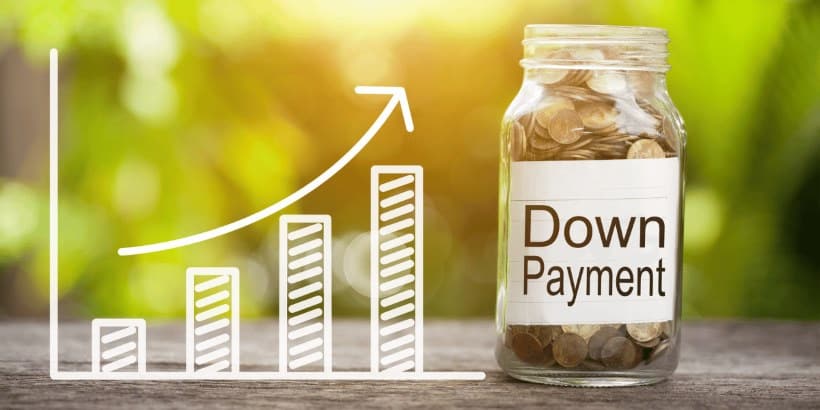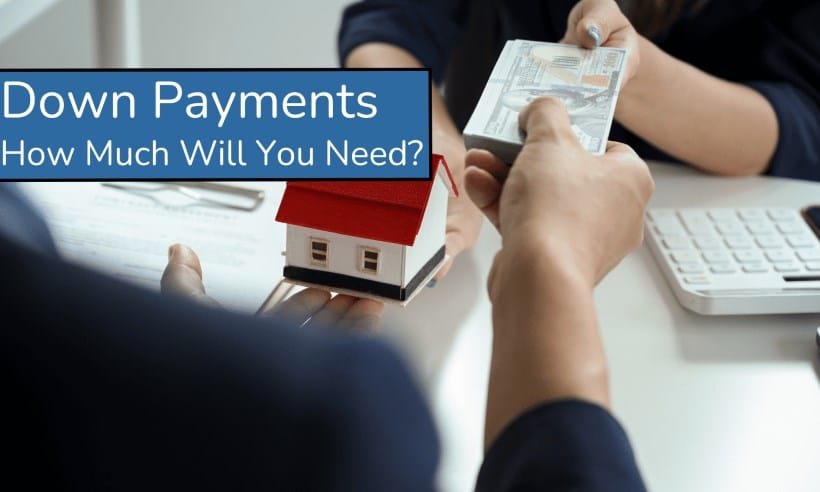For many, the dream of homeownership often begins with a singular question: “How much should I save for a down payment?” It’s a critical query and one that can shape the course of your home loan process. Before diving deep into percentages, loan types, and savings strategies, let’s first unpack the fundamental idea of a down payment.
At its core, a down payment is the upfront amount you pay when purchasing a home, with the rest of the home’s price covered by your mortgage. Think of it as your initial investment in your new property, a show of commitment to lenders, and a foundation for your future in the residence.
It’s more than just a transactional necessity; it’s a pivotal step towards establishing your space in the community. While the common perception is that you need a hefty 20% down, the reality is often different. So, how much do you really need? Let’s explore.
What is a Down Payment?
A down payment is, quite simply, the initial chunk of money you shell out when buying a house. Rather than paying the full price upfront, this payment represents a portion, with the remaining balance typically financed through a mortgage loan.
Its importance in the home-buying process can’t be understated. The down payment affects not only the size of your loan and monthly mortgage payments but also determines if lenders view you as a trustworthy borrower.
To better visualize, picture a home loan structure as a puzzle. The down payment is the foundational piece, setting the stage for everything that follows: loan principal, interest rates, loan terms, and monthly payments. It’s a clear indication to lenders of your financial stability and willingness to commit to long-term homeownership.
Factors Influencing Down Payment Amount
Your down payment isn’t a one-size-fits-all figure; it varies based on several factors. Understanding these can provide clarity on how much you might need to save.
Property Type
- Primary Residences: If you’re buying a home to live in (rather than rent out or use occasionally), lenders often offer the most lenient down payment requirements.
- Investment Properties: Since these carry a higher risk (due to potential rental income variability), they often require a higher down payment.
- Vacation Homes: These fall somewhere in between. Not your primary dwelling, but also not purely an investment, the down payment requirements can vary.
Loan Types
- FHA Loans: Insured by the Federal Housing Administration, these loans often cater to first-time homebuyers and may require as little as 3.5% down, depending on your credit score.
- VA Loans: For veterans and active-duty military members, VA loans can sometimes offer 0% down.
- Conventional Loans: These are not government-insured and typically come with varied down payment requirements, often ranging from 3% to 20% or more.
Credit Score
Your credit score is like a financial report card, and lenders use it to gauge risk. A higher score might qualify you for a lower down payment or better loan terms, while a lower score might mean a larger down payment is necessary.
Location
Geography matters in real estate, not just for home prices but for down payment requirements as well. Some areas have special housing programs or incentives that can affect your down payment. Additionally, rural or high-need areas might offer attractive terms for new homeowners willing to invest in the community.
In the labyrinth of home buying, understanding these factors can act as your guiding compass, ensuring you’re well-prepared for the financial journey ahead.

Benefits of a Larger Down Payment
Stepping into the real estate market with a hefty down payment can yield a plethora of benefits that stretch well beyond the initial purchase. In fact, one of the biggest mistakes that homebuyers make is not putting down enough (when they can). Here’s how a bigger upfront investment can pay off in the long run:
- Lower Monthly Payments: Simply put, the more you pay upfront, the less you’ll owe. This means smaller monthly mortgage payments, which can provide significant relief to your budget.
- Less Interest Over the Life of the Loan: A smaller loan amount usually means you’ll pay less interest over time. Think of it as a two-fold saving: You’re borrowing less money and often getting a better interest rate to boot.
- Potential for No Mortgage Insurance: Mortgage insurance, often a requirement for down payments under 20%, protects lenders if a borrower defaults. A heftier down payment could help you bypass this extra cost.
- More Equity in the Home Upfront: A bigger down payment means you own a larger portion of your home from the get-go. This can be especially advantageous if property values dip in the future.
- Better Mortgage Rates: Lenders often reserve their best rates for borrowers who present the least risk. A sizable down payment can signal to lenders that you’re a prime candidate for a loan, potentially securing you a more favorable rate.
Challenges with a Larger Down Payment
While there are undeniable benefits to making a substantial down payment, it’s also essential to be aware of the potential pitfalls:
- Longer Time to Save: Accumulating a sizable down payment can take years, even decades. This prolonged saving period could delay your homeownership dreams.
- Missed Opportunities: While you’re saving, the real estate market isn’t static. Prices might rise, and you could miss out on purchasing a home in your desired location or at a price point you were comfortable with.
- Opportunity Cost: Every dollar put towards your down payment is a dollar not invested elsewhere. Whether it’s the stock market, a business venture, or another investment opportunity, it’s worth considering what returns those funds might have generated if allocated differently.
Balancing the advantages and drawbacks is crucial. While a larger down payment has its perks, it’s essential to evaluate your financial situation holistically, ensuring you’re making the best decision for your current circumstances and future goals.
Low Down Payment Options and Programs
The dream of homeownership is attainable even if you don’t have a massive chunk of money saved up. Several programs and loan options cater to those looking to put down a smaller amount:
- FHA Loans: Backed by the Federal Housing Administration, FHA loans are popular among first-time homebuyers. They typically require a down payment of just 3.5% for those with a credit score of 580 or higher.
- VA Loans: For our veterans and active-duty military, the Department of Veterans Affairs offers VA loans, which often come with no down payment requirement and favorable interest rates.
- USDA Rural Development Loans: For homes in eligible rural and suburban areas, the U.S. Department of Agriculture offers loans with no down payment. It’s a fantastic option if you’re looking at properties outside major urban centers.
- State and Local Assistance Programs: Many states, counties, and municipalities offer assistance programs for first-time buyers or those with specific income levels. These can include down payment grants, interest-free loans, or tax credits.
Determining the Right Down Payment for You
Finding the sweet spot for your down payment is a personal journey. Here’s how you can navigate your decision-making:
- Evaluate Personal Financial Health and Goals: Take a deep dive into your finances. Understand your savings, monthly expenses, and long-term goals. It’s essential to ensure that you’re not stretching yourself too thin and that your homeownership plans align with other life goals.
- Consider Current and Future Market Conditions: A rapidly rising market might encourage a quicker purchase with a smaller down payment, while a stable or declining market might allow you more time to save.
- Consult with an Advisor: While it’s essential to do your research, getting expert advice can be invaluable. Professionals can provide insights tailored to your financial situation, helping you make an informed decision.
In the end, the right down payment is a balance of what you can afford, the market conditions, and your long-term financial and personal goals.

Tips to Save for a Down Payment
Saving for a down payment might seem daunting, but with determination and some strategic planning, it can be more manageable than you think. Here are some tried-and-true methods to bolster your savings:
- Setting a Budget and Sticking to It: Before you can start saving, you need to know where your money’s going. Track your spending, identify areas for cuts, and allocate a portion of your monthly income specifically for your home fund.
- Opening a Dedicated Savings Account: Separate your down payment fund from your regular savings. This not only helps in keeping track but also reduces the temptation to dip into it for other expenses.
- Automating Savings: Set up automatic transfers to your down payment savings account. By treating it like a non-negotiable monthly bill, you ensure consistent savings growth.
- Considering a Side Hustle or Selling Unneeded Items: From freelancing to decluttering, there are numerous ways to earn extra cash. Allocate these additional funds directly to your house savings.
- Exploring Gift Funds or Loans from Family: Some homebuyers receive financial assistance from family members. If this is an option for you, ensure you understand the implications, both financially and relationally.
Conclusion & Next Steps
Understanding the ins and outs of down payments is crucial in your homeownership journey. It’s not just about the amount; it’s about aligning it with your financial health and the housing market‘s pulse. Remember, while this article provides a solid foundation, every individual’s situation is distinct.
At Kenmore Team, we’ve guided countless clients through this process. Don’t navigate these waters alone; reach out to us. Whether you’re just beginning to save or are on the brink of your homebuying dream, we’re here to provide you with tailored advice and ensure your journey is as seamless as possible. Let us be your trusted partner in this exciting chapter of your life.

